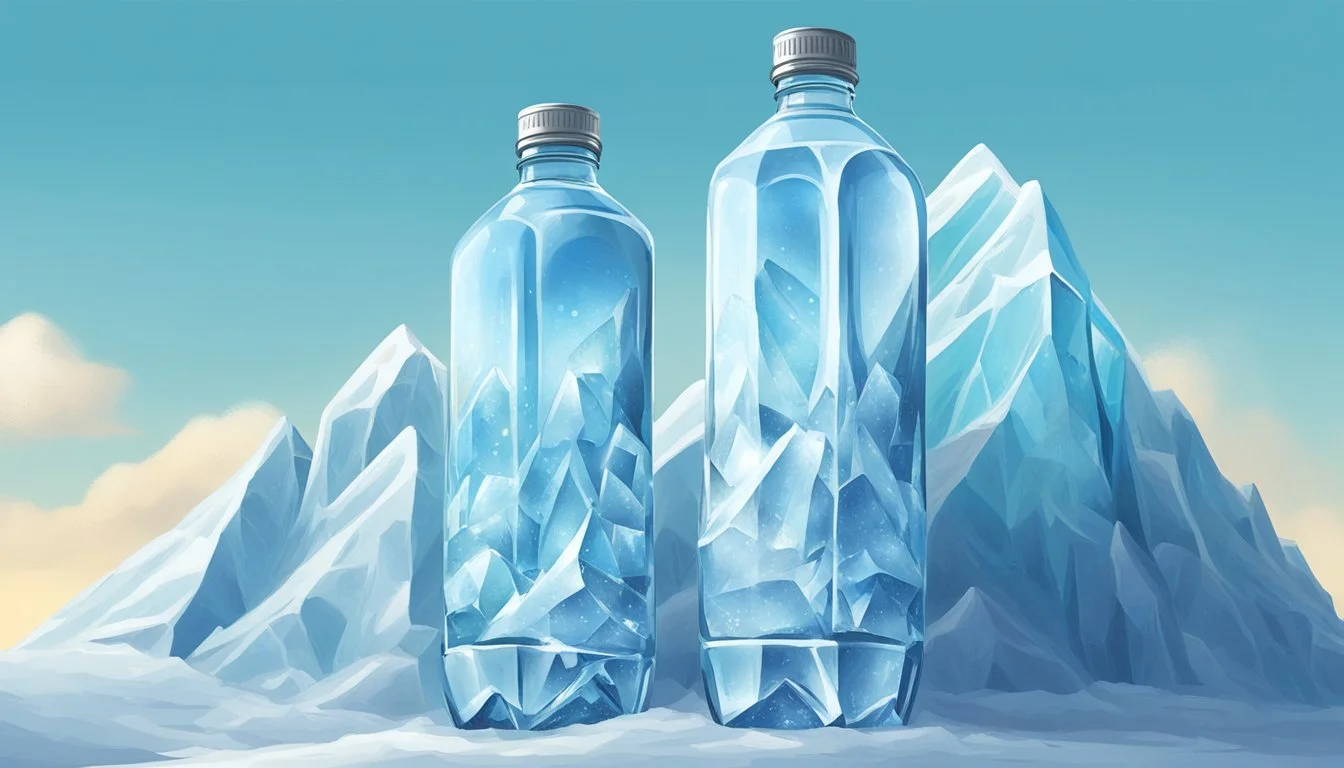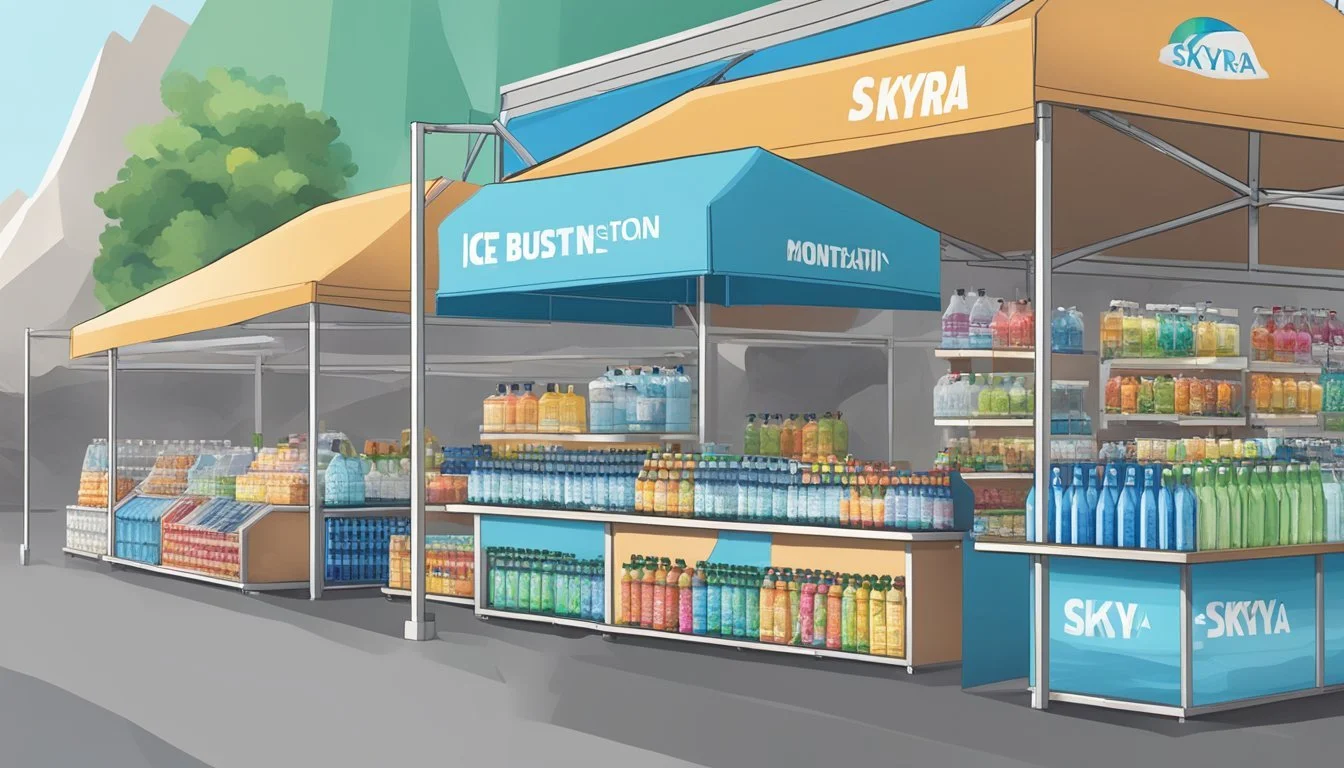Ice Mountain vs. Skyra
Comparing Premium Bottled Water Brands
Choosing the best bottled water can be tricky with so many options available. Ice Mountain and Skyra are two popular choices that many consumers debate over. When pitted against each other, Ice Mountain's crisp taste and affordability make it a strong contender, while Skyra stands out with its high mineral content and unique Icelandic source.
Ice Mountain is often praised for its clean and refreshing taste, sourced from natural springs in the United States. Many find it to be a reliable option for daily hydration without any off-putting aftertaste. The affordability factor also adds to its appeal, making it accessible for a wide range of consumers.
Skyra, sourced from Iceland, offers a unique high-mineral content that distinguishes it from many competitors. It is often touted for its pure composition and the pristine conditions of its natural source. The mineral richness not only enhances the taste but also provides added health benefits for those seeking more from their bottled water. This sets Skyra apart as a premium option for enthusiasts and health-conscious individuals.
History and Origin
Ice Mountain and Skyra, two notable brands in the bottled water market, have distinct histories and sources, each contributing to their unique characteristics and reputation.
Brand Foundations
Ice Mountain is a part of the extensive Nestlé Waters family. Launched in the early 1980s, it capitalized on the growing trend for bottled water in the United States. Sourced from natural springs in the Midwest, Ice Mountain grew in popularity for its crisp taste and commitment to quality.
Skyra, on the other hand, is a newer entrant in the bottled water arena. It originates from the pristine springs of Iceland, specifically tapping into the natural purity of Icelandic glacial waters. Skyra emphasizes its commitment to sustainability and the natural environment, building a foundation on eco-friendly practices and high-quality water.
Water Source Exploration
Ice Mountain's water sources are predominantly in Michigan, tapping into naturally occurring springs in the region. The water undergoes a multi-step filtration process that ensures the removal of impurities while retaining essential minerals, resulting in what is marketed as naturally refreshing spring water.
Skyra's source is a bit more exotic, hailing from the glacial springs of Iceland. The water is naturally filtered through the island's volcanic rock, providing a unique mineral composition and exceptional purity. This remote and untouched source is a selling point for many consumers who value natural spring water with minimal human interference.
Both brands emphasize the importance of their water sources in maintaining the purity and quality of their bottled water, though they draw from very different geographical regions and geological processes.
Scientific Analysis of Water Quality
Ice Mountain and Skyra bottled waters exhibit notable differences in their water quality, especially in terms of purity and nutrient content. Understanding these distinctions is essential for consumers making informed choices about hydration.
Assessing Purity
When analyzing the purity of bottled waters like Ice Mountain and Skyra, the focus rests on contaminants, filtration processes, and overall water source quality. Ice Mountain typically undergoes a rigorous filtration process that includes reverse osmosis, which helps remove impurities.
Skyra, sourced from Iceland, benefits from naturally occurring filtration through volcanic rock, resulting in remarkably pure water with fewer contaminants. Scientific assessments often examine the presence of PFAS chemicals—contaminants found in some bottled waters. Both brands have been tested for such chemicals but results can vary based on source and bottling practices.
Measuring purity also involves evaluating the pH levels. Ice Mountain typically has a slightly acidic to neutral pH, aligning with EPA standards. Skyra, on the other hand, often boasts a more alkaline pH, which some believe offers additional health benefits. Analyzing the specific contaminants, if present, and the effectiveness of the purification techniques provides insights into the quality and safety of the water.
Nutrient Content and Health Benefits
The nutritional profile of Ice Mountain and Skyra water includes important minerals like calcium and magnesium, crucial for metabolic processes and bone health. Ice Mountain frequently includes moderate levels of these electrolytes due to its filtration process, focusing on maintaining balanced mineral content.
Skyra, marketed as a premium mineral water, is rich in minerals naturally absorbed from the volcanic source. This results in higher levels of beneficial electrolytes that support hydration and overall well-being.
Hydration quality is another aspect worth noting. Ice Mountain provides a refreshing option suitable for daily use, while Skyra claims superior hydration due to its unique mineral balance. These differences in nutrient content can influence metabolic functions and general health.
In conclusion, the scientific analysis of Ice Mountain and Skyra bottled waters reveals key differences in purity and nutrient content, influenced by their distinct sources and purification methods.
Taste Profiles and Consumer Preferences
Evaluating the taste profiles of Ice Mountain and Skyra, as well as consumer preferences, reveals subtle but important distinctions in their water offerings.
The Flavor of Purity
Ice Mountain is known for its crisp and clean taste, attributed to its multi-step filtration. This process includes initial screening and further purification steps that remove impurities. The resulting flavor is often described as refreshing and neutral, making it a popular choice among consumers who prefer a no-nonsense drinking experience.
Skyra, sourced from Iceland, is characterized by its soft mineral profile. The water boasts a slightly alkaline pH and is naturally filtered through volcanic rocks. This imparts a unique, smooth taste that some describe as slightly sweet. The distinct flavor profile sets it apart from more traditional bottled waters, appealing to those seeking a subtle, yet distinctive taste.
Expert Insights
Water sommeliers frequently highlight the significance of source and filtration methods in defining water taste. According to Maurice Kennedy, a water sommelier, Ice Mountain’s rigorous filtration ensures consistent purity, making it a reliable option for clean drinking water. Its taste is often described as neutral, which can make it a versatile choice for various consumer palates.
In contrast, Skyra’s natural filtration through volcanic rocks contributes to its unique mineral content. Experts emphasize that this natural filtration enhances the water’s smoothness and slight sweetness. These attributes may appeal to consumers looking for natural water with a distinctive flavor profile. Such insights underscore the importance of understanding the nuanced differences in bottled water to make informed purchasing decisions.
Manufacturing Processes
The manufacturing processes of bottled water involve various techniques and have significant environmental implications. These processes include specific bottling techniques and the environmental impact related to packaging and transportation.
Bottling Techniques
Ice Mountain utilizes a multi-step filtration process. It begins with screening to remove large particles and continues with advanced filtration to ensure purity. The water is then bottled in both recycled plastic and glass bottles.
Skyra sources its water from Iceland, leveraging the hydrologic cycle's natural filtration through volcanic rock. The bottling process prioritizes eco-friendly materials, like glass bottles and boxed water options, to reduce microplastics.
Comparison:
Ice Mountain: Multi-step filtration, recycled plastic, and glass bottles.
Skyra: Natural volcanic filtration, emphasis on eco-friendly packaging.
Environmental Implications
Ice Mountain's manufacturing process involves long-distance transportation, contributing to carbon emissions. The use of recycled plastic attempts to mitigate this impact. However, the presence of microplastics remains a concern.
Skyra's focus on eco-friendly packaging reduces environmental harm. Its use of glass and boxed water options limits plastic waste. Additionally, sourcing water from the hydrologic cycle in Iceland minimizes alteration of natural resources.
Comparison:
Ice Mountain: Recycled plastic, long transportation distances, carbon emissions.
Skyra: Eco-friendly packaging, reduced plastic waste, minimal resource alteration.
The manufacturing processes of both brands reflect differing approaches to bottling techniques and environmental considerations.
Packaging and Sustainability
Packaging and sustainability are crucial factors when comparing bottled water brands. The innovations in eco-friendly packaging and consumer trends towards sustainability reveal important insights into the environmental impact of Ice Mountain and Skyra.
Innovations in Eco-Friendly Packaging
Both brands are making strides in eco-friendly packaging. Ice Mountain utilizes recycled plastic for its bottles, aiming to reduce the environmental footprint. Despite primarily using plastic, the company prioritizes improving recyclability and reducing waste.
Skyra offers a unique twist by employing glass bottles. This choice decreases plastic usage and appeals to consumers seeking premium and sustainable options. Additionally, Skyra's packaging includes eco-friendly labels and caps, further emphasizing their commitment to sustainability.
Boxed Water and Liquid Death represent industry efforts towards paper cartons and aluminum cans, showcasing alternatives to traditional plastic packaging.
Consumer Trends in Sustainability
Consumers increasingly demand sustainability from bottled water brands. There is a growing preference for recycled plastic and glass bottles, seen as more environmentally friendly options. Brands like Coca-Cola and Pepsico have acknowledged this trend by investing in sustainable practices and materials.
A significant number of shoppers now prioritize eco-friendly packaging and are more likely to support companies demonstrating genuine environmental responsibility. The consumer shift towards eco-friendly products reflects broader societal concerns about climate change and plastic pollution, pushing brands to adopt greener practices and innovate in packaging solutions.
Health and Safety Standards
For both Ice Mountain and Skyra, health and safety standards are critical. This section explores the regulatory compliance measures and consumer safety practices employed by each brand to ensure high-quality drinking water.
Regulatory Compliance
Ice Mountain and Skyra both adhere to strict regulatory standards to ensure their bottled water meets the highest quality criteria. In the United States, the Food and Drug Administration (FDA) regulates bottled water, requiring it to meet standards that are the same as or stricter than the Environmental Protection Agency (EPA) standards for public water sources.
Ice Mountain follows FDA regulations closely, using rigorous testing protocols to maintain quality and safety. The brand also adheres to standards set by international bodies, ensuring global quality compliance.
Skyra also complies with FDA and EPA regulations, utilizing advanced purification methods such as reverse osmosis to remove contaminants. Both brands aim to limit the presence of PFAS chemicals, a group of man-made substances linked to various health issues.
Consumer Safety
Both brands prioritize consumer safety by implementing stringent filtration and purification processes. Ice Mountain employs a multi-step filtration process, which includes the reduction of contaminants and microplastics, ensuring that the water is safe for consumption. The brand’s commitment to safety is reflected in its compliance with both FDA and International Bottled Water Association (IBWA) standards.
Skyra, on the other hand, incorporates reverse osmosis and other purification methods to ensure the removal of harmful substances. Regular testing for contaminants, including PFAS chemicals, ensures that the water remains pure and safe for consumer use.
Both Ice Mountain and Skyra take significant measures to meet and exceed the necessary health and safety standards, providing consumers with high-quality and safe bottled water options.
Market Presence and Accessibility
Ice Mountain and Skyra are bottled water brands known for their distinctive qualities and market positions. Their availability and pricing significantly impact consumer preferences.
Brand Availability
Ice Mountain is widely accessible due to its strong regional presence, especially in the Midwest United States. It's sourced from natural springs, making it a popular choice in numerous local stores and major retail chains.
Skyra, on the other hand, is marketed as premium water, sourced from Iceland. Its availability may be more limited compared to Ice Mountain. However, it is often found in specialty stores and higher-end supermarkets. This can make Skyra less convenient for consumers seeking a more readily available option.
Comparative Costs
Ice Mountain typically offers competitive pricing, which appeals to budget-conscious consumers. Its pricing strategy ensures that it remains an affordable option in the bottled water market.
Skyra positions itself as a premium brand, often reflected in higher prices. This premium cost can be attributed to its unique source and the costs associated with importing Icelandic water. Consumers seeking high-quality, unique bottled water may find the higher price justified.
Table: Cost Comparison
Brand Price Range Availability Ice Mountain Affordable Widely available in Midwest Skyra Premium Specialty and high-end stores
By examining the availability and costs of Ice Mountain and Skyra, it is evident that the choice between them often balances convenience against premium quality.
Conclusion
Ice Mountain and Skyra serve different preferences and priorities among bottled water consumers.
Ice Mountain uses a multi-step filtration process, emphasizing purity and particle removal. It is a popular choice for those who prioritize a tried-and-tested filtration method.
Skyra, sourced from Iceland, is known for its natural origin and rich mineral content. This water appeals to individuals looking for a more unique and naturally sourced hydration option.
In terms of taste, Ice Mountain provides a clean and refreshing experience. It lacks strong mineral overtones, making it suitable for a wide range of consumers.
Skyra offers a slightly mineral-rich taste, which some may find more appealing. Its distinct profile stands out among typical bottled waters.
Availability can also be a factor. Ice Mountain is widely distributed and easily accessible in many regions, while Skyra might be harder to find, adding an exclusive feel to it.
For both products, hydration is the ultimate goal. Each brand ensures that it delivers on this fundamental need.
Table Comparison:
Feature Ice Mountain Skyra Source Multi-step Filtration Icelandic Origin Taste Clean and refreshing Mineral-rich Availability Widely accessible Less common
Choosing between Ice Mountain and Skyra depends on personal preference, taste, and values regarding water sourcing and production. Both are capable of providing quality hydration.
More About Ice Mountain
Core Hydration vs Ice Mountain: Which Bottled Water is Better?
Ice Mountain vs Aqua Carpatica: Which Bottled Water is Better?
Ice Mountain vs Cascade Mountain: Which Bottled Water is Better?
Ice Mountain vs Crystal Geyser: Which Bottled Water is Better?
Ice Mountain vs Crystal Lake: Which Bottled Water is Better?
Ice Mountain vs Essence pH10: Which Bottled Water is Better?
Ice Mountain vs Hawaii Volcanic: Which Bottled Water is Better?
Ice Mountain vs Hawaiian Springs: Which Bottled Water is Better?
Ice Mountain vs Icelandic Glacial: Which Bottled Water is Better?
Ice Mountain vs Kirkland Signature: Which Bottled Water is Better?
Ice Mountain vs Liquid Death: Which Bottled Water is Better?
Ice Mountain vs Mountain Valley Spring Water: Which Bottled Water is Better?
Ice Mountain vs Nestle Pure Life: Which Bottled Water is Better?
Ice Mountain vs Poland Spring: Which Bottled Water is Better?
Ice Mountain vs Proud Source: Which Bottled Water is Better?
Ice Mountain vs Purely Sedona: Which Bottled Water is Better?
Ice Mountain vs Richard's Rainwater: Which Bottled Water is Better?
Ice Mountain vs San Pellegrino: Which Bottled Water is Better?
Ice Mountain vs Simple Truth: Which Bottled Water is Better?
Ice Mountain vs Solan de Cabras: Which Bottled Water is Better?
Ice Mountain vs Talking Rain AQA: Which Bottled Water is Better?
Ice Mountain vs Whole Foods 365: Which Bottled Water is Better?
Ice Mountain vs Whole Foods Italian Still Mineral water: Which Bottled Water is Better?






